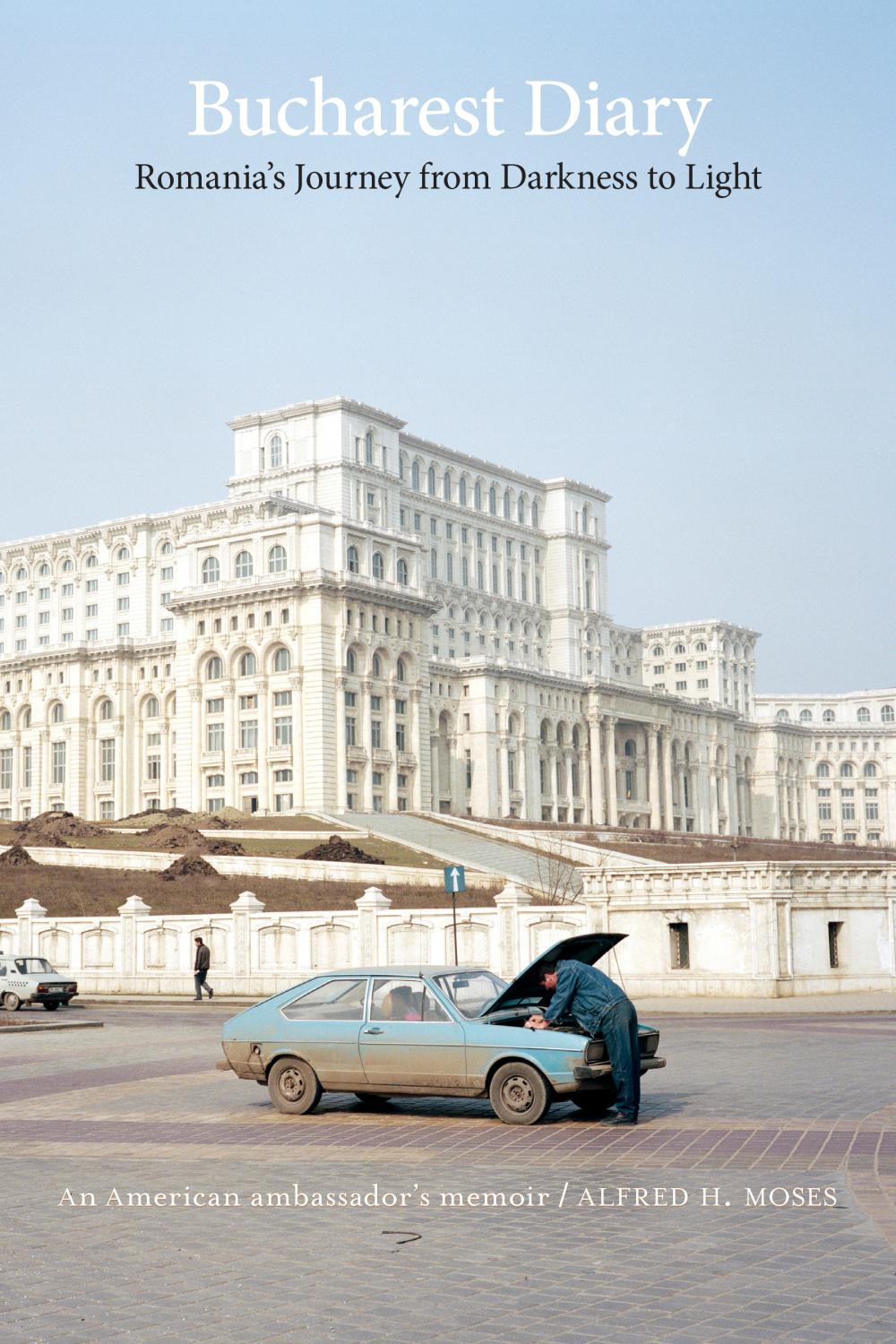Bucharest Diary: Romania’s Journey From Darkness to Light
An insider’s account of Romania’s emergence from communism control
In the 1970s American attorney Alfred H. Moses was approached on the streets of Bucharest by young Jews seeking help to emigrate to Israel. This became the author’s mission until the communist regime fell in 1989. Before that Moses had met periodically with Romania’s communist dictator, Nicolae Ceausescu, to persuade him to allow increased Jewish emigration. This experience deepened Moses’s interest in Romania—an interest that culminated in his serving as U.S. ambassador to the country from 1994 to 1997 during the Clinton administration.
The ambassador’s time of service in Romania came just a few years after the fall of the Berlin Wall and the subsequent collapse of communism in Eastern Europe. During this period Romania faced economic paralysis and was still buried in the rubble of communism. Over the next three years Moses helped nurture Romania’s nascent democratic institutions, promoted privatization of Romania’s economy, and shepherded Romania on the path toward full integration with Western institutions. Through frequent press conferences, speeches, and writings in the Romanian and Western press and in his meetings with Romanian officials at the highest level, he stated in plain language the steps Romania needed to take before it could be accepted in the West as a free and democratic country.
Bucharest Diary: An American Ambassador’s Journey is filled with firsthand stories, including colorful anecdotes, of the diplomacy, both public and private, that helped Romania recover from four decades of communist rule and, eventually, become a member of both NATO and the European Union. Romania still struggles today with the consequences of its history, but it has reached many of its post-communist goals, which Ambassador Moses championed at a crucial time.
This book will be of special interest to readers of history and public affairs—in particular those interested in Jewish life under communist rule in Eastern Europe and how the United States and its Western partners helped rebuild an important country devastated by communism.
Praise for Bucharest Diary
“An important firsthand account of how the so-called third wave of democratization played out on the ground.”
—Gideon Rose, Foreign Affairs
“During his three years as the American ambassador to Romania, Al Moses undertook the arduous task of putting American-Romanian relations on firm footing. Ambassador Moses’s book begins with his efforts on behalf of Romania’s Jews in the 1970s and continues with vivid accounts of Romanian life, as well as the largely untold story of the art of diplomacy, from a personal perspective at a crucial time following the downfall of communism in Europe. His great devotion and effort helped improve the lot of millions of people and earned him the Order of the ‘Star of Romania.’”
—Teodor Melescanu, minister of foreign affairs, Romania
“Ambassador Moses is one of those who led the effort to bring to Israel Jews who would otherwise have remained in Romania, virtual prisoners under communist dictator Nicolae Ceausescu. Moses’s book tells the story of the exodus of Romanian Jews to Israel and the means he employed to gain their freedom. He describes in vivid detail Jewish life in Romania before and after Ceausescu fell and his unique role as American ambassador in Romania after decades of communist oppression that led to Romania’s journey to freedom.”
—Natan Sharansky, chair, Jewish Agency for Israel; deputy prime minister of Israel (2001–03)
“The fall of communism in Eastern Europe presented U.S. policymakers with a historic opportunity to help the countries in the region build free market economies and democratic political institutions. As our ambassador to Romania during this critical period, Al Moses dedicated his great energy and powers of persuasion to encourage Romania’s political leaders to take the bold steps needed to rejoin the West. I was present when Romanian President Ion Iliescu met with President Clinton in the Oval Office in September 1995, and again when President Clinton visited Bucharest in July 1997. I witnessed Romania’s march on the road to freedom and Ambassador Moses’s contribution to Romania’s success. His book tells this story in gripping and inspiring language. It is a must-read for those interested in U.S. foreign policy at its best.”
—Strobe Talbott, U.S. deputy secretary of state (1994–2001)
Author
Alfred H. Moses is a Washington attorney, author, and former partner in a major Washington law firm. He was special counsel to President Carter (1980-81), U.S. ambassador to Romania (1994-97), and special presidential envoy for the Cyprus conflict (1999-2001). He was national president of the American Jewish Committee immediately before becoming ambassador. Presently chairman of UN Watch (Geneva), he has written several books and numerous articles appearing in the New York Times, the Washington Post, and other periodicals in the United States, Europe, and Israel. In 2002 he was awarded Romania's Marc Cruce Medal (Order For Merit) by President Ion Iliescu of Romania, the only American to have been so honored.
Media Coverage
The audacity of diplomacy How Washington’s Alfred Moses took on Romania ‘as a client’
How an American Moses helped lead Romania’s Jews to the Promised Land

